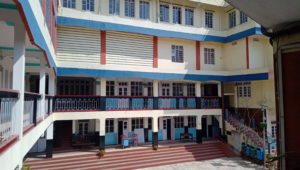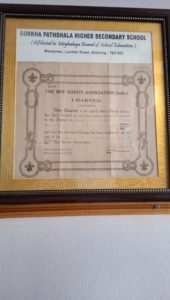Sunday Shillong visits Gorkha Pathshala Higher Secondary School, one of the oldest in North-East India
“Education is the most powerful weapon which you can use to change the world.” — Nelson Mandela

The essence of education is to unlock the door to the mysteries of the world and to imbibe a spirit of an enquiring mind. Knowledge-building is not just limited to textbooks; it is the all-round development of character, curiosity and a vision towards an inclusive, progressive society.
Sunday Shillong caught up with Pushpa Biswa and Krishna Joshi, Principal and Vice Principal of Gorkha Pathshala Higher Secondary School respectively, to get an idea about one of the oldest schools of North-East India.
Like its motto, “Service Before Self”, the school’s contribution to the region is unparalleled.
Founder Member
The Gorkha community entered the North-East with the British authorities and settled in Sohra (Cherrapunji) in 1826. The area was infested with mosquitoes then and malaria was a problem. They migrated to Shillong and settled in and around the cantonment areas. They had family but there was no school for their children.
The Gorkha community felt it was lagging behind in education and the need for a school grew. Mani Singh Gurung rose to the occasion and had a few Gorkha ex-servicemen as his associates.
Gurung or Mani Babu, as he was lovingly called, was born to Captain Abhiram and Basundhara Gurung. His father served in the 2/8 Gorkha Rifles that shifted from Manipur to Shillong. The family settled in Upper Mawprem. Mani was five years old then. He and his brother Dhruva Singh Gurung were home-schooled and later, enrolled in the Government Boys’ High School. Both brothers were academically brilliant. They passed their Matric examination with Dhruva securing distinction in Sanskrit.
As circumstances would have it, his parents shifted to Lansdowne when his battalion shifted there. The two brothers were left under the care of their relatives so that their education was not disrupted. Two of their siblings were born in Lansdowne, brother Narayan Singh Gurung and sister Durga Devi Gurung – both of whom were sent to King George School to be educated under the British system of education.
Back in Shillong, young Mani realised that his passion lay in education, passing both the IA and BA examinations in 1912 and 1915, respectively. He would go on to become the first Graduate from the Gorkha community. He was a polyglot and had mastered several languages – Hindi, Assamese, Bengali and Sanskrit, among others.

Vision and Journey
It was Jaichand Thakuri who donated a plot of land for the development of the school.
Mani Babu worked tirelessly towards the growth and development of the school. Dhruva, who was then a tutor to the royal family of Sikkim, was called back to Shillong and he joined Gorkha Pathshala as a teacher. With a handful of dedicated teachers like Nandalal Rai and Narayan Singh Gurung, the school grew to new heights. The original vision to develop the Gorkha community along modern lines slowly gained momentum.
The initial journey was met with hurdles. Funding was an issue. Not only the community in Shillong, but the Gorkhas from all over India supported the school financially. The British authorities did not help much in terms of funding – their educational interests lay only in establishing missionary schools.
There was no proper infrastructure either – classes were held outside the old Radha Krishna temple.
The other area of concern was the smaller number of students; only a handful showed interest initially.
Originally, it started as an elementary school with classes offered up to grade III. In 1928, they started the middle school which got upgraded to high school in 1965. Later, they started the higher secondary section. It has opened its doors to children of all communities besides the Gorkha.
Unparalleled Legacies
Gorkha Pathshala Higher Secondary School has not only shaped the Gorkha community of Meghalaya, but has contributed in other fields too.
Credit goes to this institution for starting the first Bharat Scouts and Guides in Shillong, the then capital of erstwhile undivided Assam. Biswa, the Principal, said a foreign scoutmaster had come to Shillong in 1937.
In addition, the school has contributed to National Cadet Corps and Indian Red Cross Society.
Modern Challenges
Joshi, the Vice Principal, gave us an idea about the challenges that remain.
Most of the children come from families below the poverty line, whose parents are daily wage labourers. 90 per cent of them face financial crisis – with the global pandemic changing the nature of education, online classes are particularly challenging. Most of the children do not own smartphones. The teachers had to adapt to ensure that no child feels left out. They worked together to make notes where the digital option would not work. Many of the children come from remote areas and had to go back to their villages. He said many of them are yet to return to Shillong.
With many of the daily wage labourers losing their jobs, the school authorities tried to help the families financially. Four months’ school fees were exempted during the peak of the pandemic last year. However, the students are allowed to give their exams with the hope that things will return to normal soon. In addition, mid-day meal rice was distributed to the families. Local NGOs also came to their aid in this regard.
Both Joshi and Biswa mentioned that in this critical juncture, it has become imperative to accommodate those in trouble, adding how full salary is being paid to the teachers, among other service-oriented works.
Our conversation shifted to the quality of education between government and private schools. The initiative to bridge the gap between the two has to come from the government at the policy level; once implemented, educationists would have to abide by it. Infrastructure is crucial for any institution to function properly. For instance, digital education means adapting to change. With exams also being held online, a particular routine has to be followed. Issues like power cuts do not help.
Joshi said: “Teaching itself is a challenge. We have to be patient”. Biswa echoed his sentiments. “The New Education Policy has to be implemented as early as possible. It will definitely bridge the gap between government and non-government schools. Ultimately, it will benefit the students,” she said.
The school is affiliated to the Meghalaya Board of School Education. The fact that the children have performed well shows in their excellent results in the form of rank holders in the board exams. The competition runs neck-to-neck with other schools.
This goes on to show that while funding is important, it alone does not decide who is a good student. In most government schools, and especially those that cater to the lower rungs of the society, teachers have to work round the clock to ensure that no child feels neglected – one of the reasons for this is that most of the parents are not literate and depend on the teachers to give hope of a better future for their children.
We left the school premises with more questions than answers. Perhaps, now is the time to ensure that government-run schools have access to a robust infrastructure to give equal opportunities to all. A seemingly inconsequential thing as the number of water taps in schools can make all the difference.



